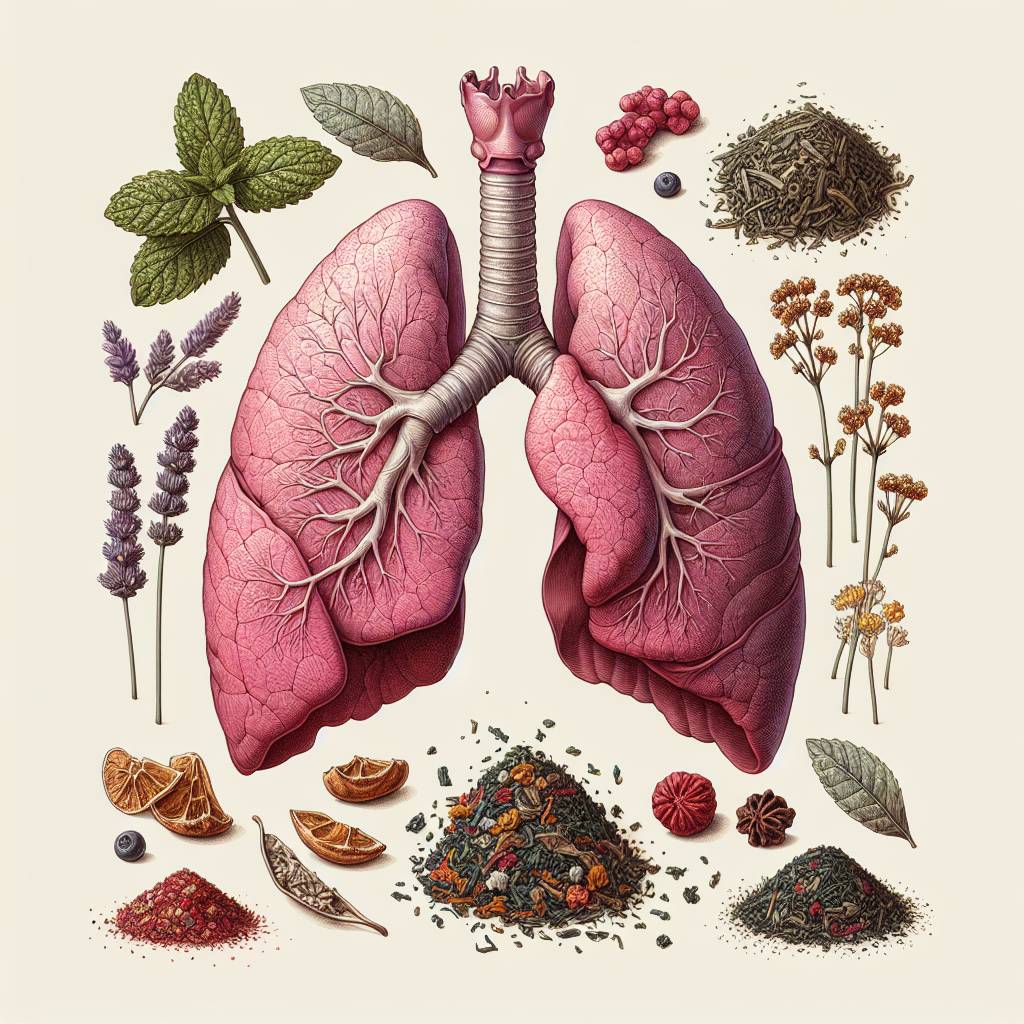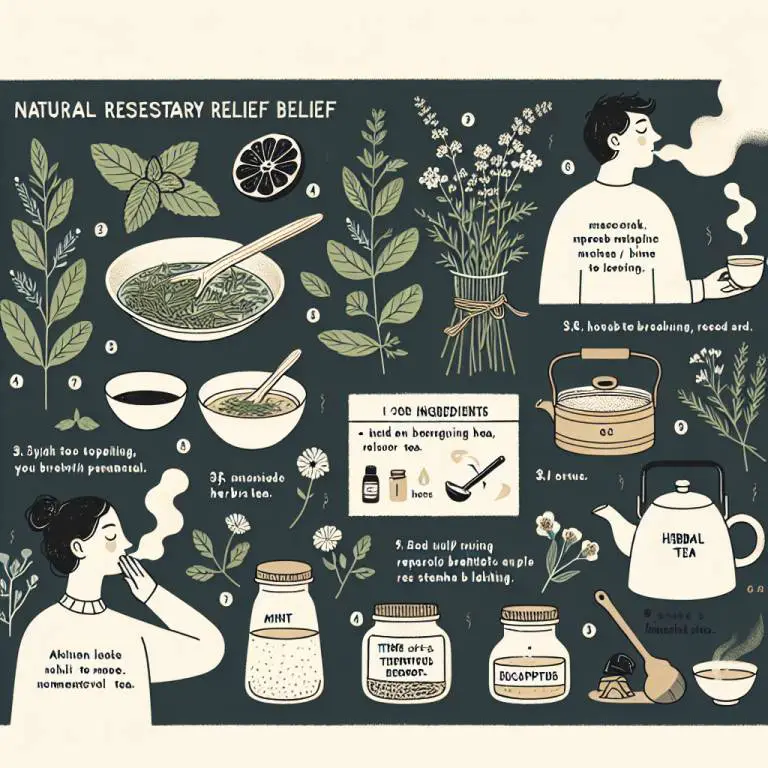Enhancing respiratory health: Herbal teas with the most benefits
Herbal teas like peppermint, ginger, and licorice root are great for enhancing respiratory health. Peppermint tea helps clear nasal passages, while ginger tea reduces inflammation in the airways. Licorice root tea supports lung health by soothing the throat and reducing irritation. These teas offer natural ways to boost lung function and overall well-being.

What are the best herbal teas for respiratory health?
Herbal teas have been used for centuries to support respiratory health. Among the most beneficial for the lungs and breathing are peppermint, eucalyptus, and licorice root teas. These teas contain natural compounds that can help soothe the throat, reduce inflammation, and improve airflow.
Peppermint tea is especially known for its menthol content, which acts as a natural decongestant, helping to break up mucus and clear the sinuses. Eucalyptus tea, on the other hand, has cineole, a compound known for its anti-inflammatory and expectorant properties. Licorice root tea helps in soothing sore throats and reducing irritation in the respiratory tract.
Which herbs are known to improve lung function?
Certain herbs stand out when it comes to enhancing lung function. Mullein, for instance, is widely recognized for its ability to cleanse the lungs and ease respiratory conditions. It acts as an expectorant, helping to expel mucus from the chest. Another notable herb is thyme, which has powerful antibacterial properties that can fight against respiratory infections.
Ginger is also beneficial due to its anti-inflammatory effects that can help reduce symptoms associated with conditions like asthma. Its compounds may help relax airway muscles and improve breathing. Incorporating these herbs into your diet or tea regimen can be a natural way to support lung health.
Explore the role of tea in asthma care. Discover beneficial varieties and tips for brewing them effectively.
How does green tea affect respiratory health?
Green tea is renowned not only for its antioxidant properties but also for its positive impact on respiratory health. The polyphenols found in green tea can help reduce inflammation in the lungs and protect against infections that could compromise respiratory function. This makes it an excellent choice for maintaining healthy airways.
Moreover, studies suggest that regular consumption of green tea may enhance lung function over time and could potentially benefit people with chronic respiratory conditions like asthma by reducing symptom severity. However, it’s important to consume it in moderation as part of a balanced diet.
Can peppermint tea help with breathing problems?
Peppermint tea is highly regarded for its potential benefits in alleviating breathing problems. The key component of peppermint is menthol, which provides a cooling sensation that can help soothe irritated throats and relieve nasal congestion. This makes peppermint tea an excellent remedy for those experiencing colds or allergies leading to breathing difficulties.
In addition to acting as a decongestant, peppermint’s antispasmodic properties may also relax the muscles of the respiratory tract, making it easier to breathe for individuals suffering from conditions like asthma or bronchitis. Drinking peppermint tea could therefore be a simple yet effective way to ease discomfort associated with various breathing issues.
< / table >
Are there any risks associated with drinking herbal teas for asthma or other respiratory conditions?
While herbal teas are often seen as a natural way to support respiratory health, they’re not without their risks. People with asthma or other respiratory conditions should be cautious. Some herbs can trigger allergic reactions or interact negatively with medications.
It’s important to consult with a healthcare provider before adding herbal teas to your routine, especially if you have a pre-existing condition. This ensures that the benefits outweigh any potential risks. Remember, what works for one person may not work for another due to individual health differences.
How can licorice root tea benefit those with respiratory issues?
Licorice root tea is known for its soothing properties, which can be particularly beneficial for those with respiratory issues. It helps in thinning mucus, making it easier to breathe. This is crucial for people suffering from conditions that lead to the buildup of phlegm in the lungs.
Beyond its expectorant capabilities, licorice root has anti-inflammatory properties that can help reduce swelling in the airways. This makes it easier for air to flow through, providing relief during asthma attacks or other respiratory flare-ups. However, it’s essential to consume licorice root tea in moderation due to its potent effects.
What role does ginger tea play in respiratory health?
Ginger tea is another powerful ally when it comes to supporting respiratory health. Its anti-inflammatory and antioxidant properties can help soothe irritated airways and boost the immune system. For those dealing with colds or flu, ginger tea can provide much-needed relief.
Moreover, ginger helps in relaxing the muscles around the airways and reducing inflammation. This can be particularly helpful for individuals experiencing asthma symptoms or other chronic respiratory conditions. Including ginger tea in your daily routine might offer additional support alongside conventional treatments.
Final Thoughts
Incorporating herbal teas into your diet could offer several benefits for respiratory health, including easing symptoms of asthma and other conditions. However, it’s crucial to approach this natural remedy with caution and awareness of potential risks.
Always consult with a healthcare professional before trying new herbal teas, especially if you have existing health concerns or are taking medication. With proper guidance and moderation, these teas can be a comforting addition to your wellness routine.
Further Reading:
| Herbal Tea | Key Benefits | Active Compounds |
|---|---|---|
| Eucalyptus Tea | Relieves respiratory conditions, acts as a decongestant. | Eucalyptol, Flavonoids |
| Mullein Tea | Reduces inflammation, helps clear mucus from the lungs. | Saponins, Flavonoids |
| Ginger Tea | Boosts immunity, relieves asthma and allergies. | Gingerols, Shogaols |
| Peppermint Tea | Acts as a natural antihistamine, clears sinuses and bronchial congestion. | Menthol, Rosmarinic acid |
| Licorice Root Tea | Soothes throat irritation and reduces coughing. | Glycyrrhizin, Flavonoids |






